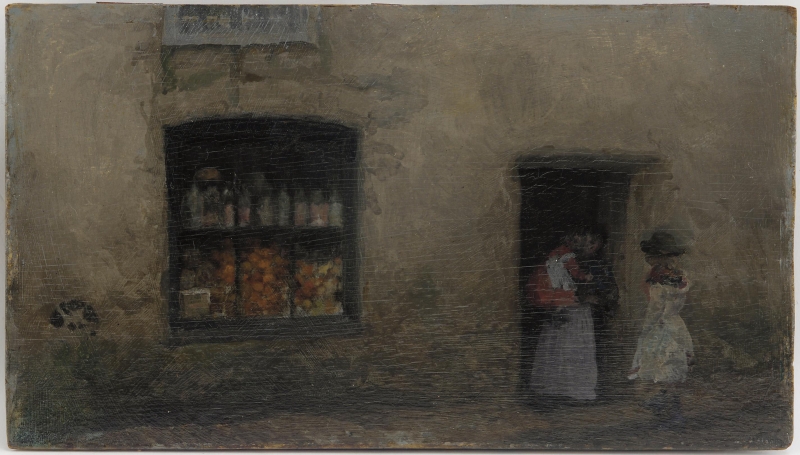Titles
The known title varies only in grammar and punctuation:
- 'An orange note – Sweet Shop' (1884, Dowdeswell). 1
- Probably 'Note en orange: Boutique de bonbons' (1887, Petit). 2
- 'An Orange Note: Sweetshop' (1904, Christie's). 3
- 'Note orange; la boutique aux bonbons (An Orange Note. The Sweet Shop' (1905, Œuvres de James McNeill Whistler, Paris). 4
- 'An Orange Note: Sweet Shop' (1980, YMSM). 5
'An Orange Note: Sweet Shop' is the preferred title.
Description
A small shop, painted in horizontal format, in a two-storey building, with only the bottom of the upper window showing. The six-paned shop window at left has a slightly arched top. The bottom shelf is piled high with oranges, while glass bottles of sweets stand on the upper shelf. To right is an open doorway with a girl or woman holding a toddler. She wears a white apron, and the child, a white pinafore over a red dress. The woman is talking to a girl in a white dress and black hat standing on the pavement at far right. The walls are a dull cream and grey, the woodwork on the window is brown, the cobbled street, grey.
Site
St Ives, Cornwall. Whistler worked at St Ives, a fishing port in south-west England, with Mortimer Luddington Menpes (1860-1938) and Walter Richard Sickert (1860-1942).
Comments
Whistler considered An Orange Note: Sweet Shop to be not only a fine work but very saleable: years later, in 1896, he wrote from Lyme Regis to David Croal Thomson (1855-1930):
'I shall have some lovely little pictures of the nature of "The little Sweet shop" - you remember - only if any thing finer in quality -
But what is the use - I dont want them to stay in England - therefore you could do nothing with them as I wish to sell no more pictures to Englishmen.' 6
Notes:
1: 'Notes' - 'Harmonies' - 'Nocturnes', Messrs Dowdeswell, London, 1884 (cat. no. 38).
2: Exposition Internationale de Peinture et de Sculpture, Galerie Georges Petit, Paris, 1887 (cat. no. 206).
3: Christie's, London, 17 December 1904 (lot 39).
4: Œuvres de James McNeill Whistler, Palais de l'Ecole des Beaux-Arts, Paris, 1905 (cat. no. 84).
Last updated: 8th June 2021 by Margaret






